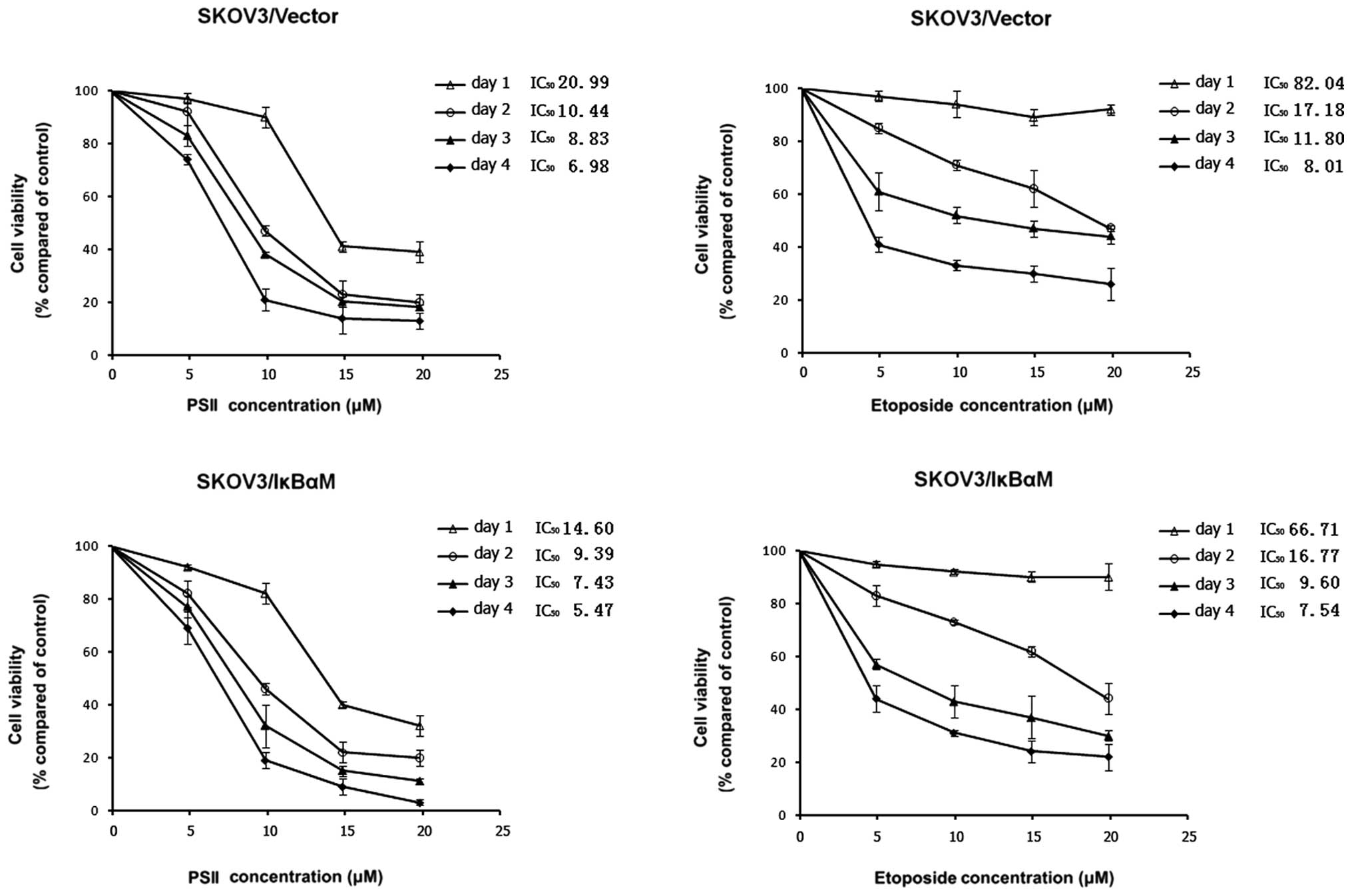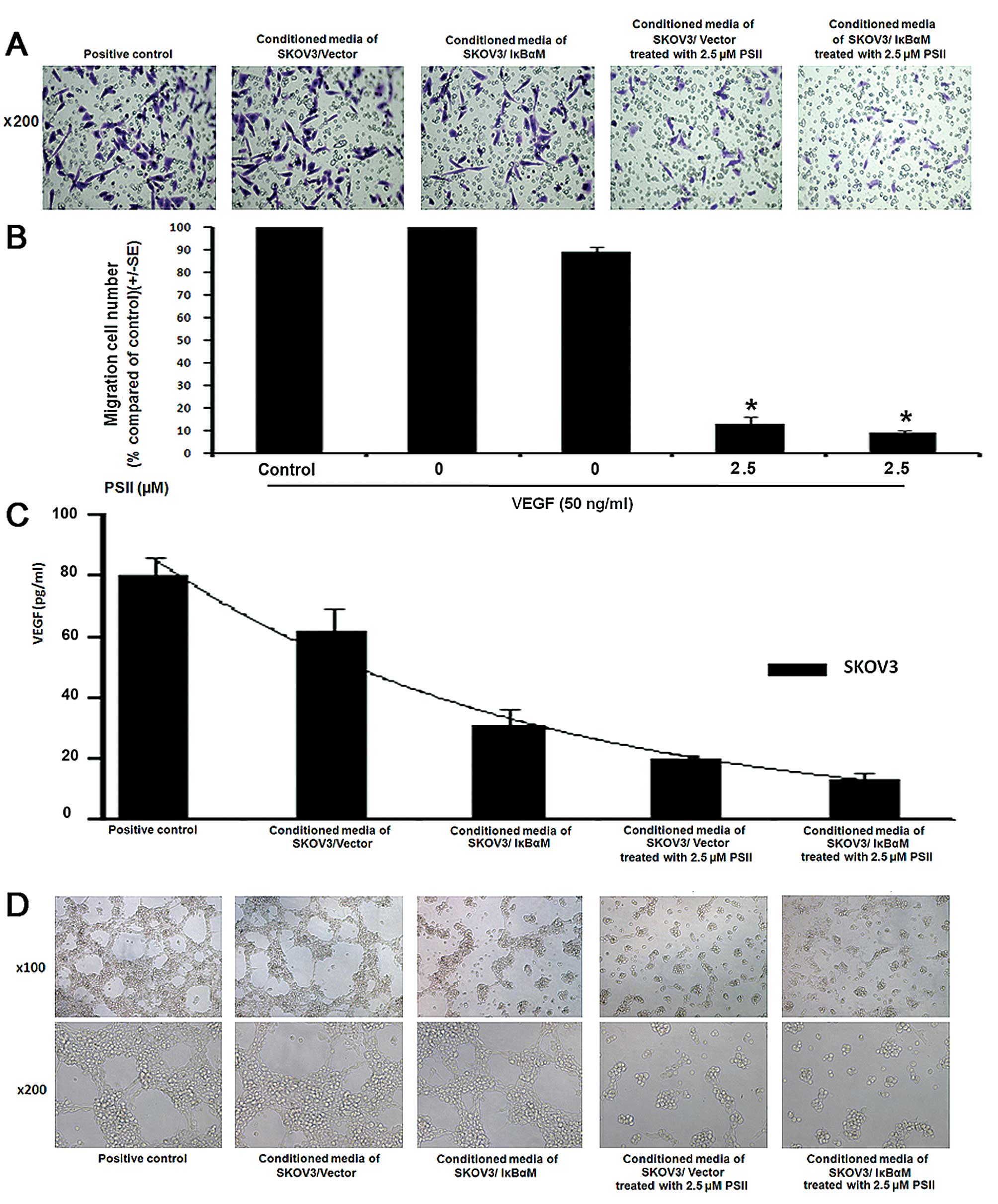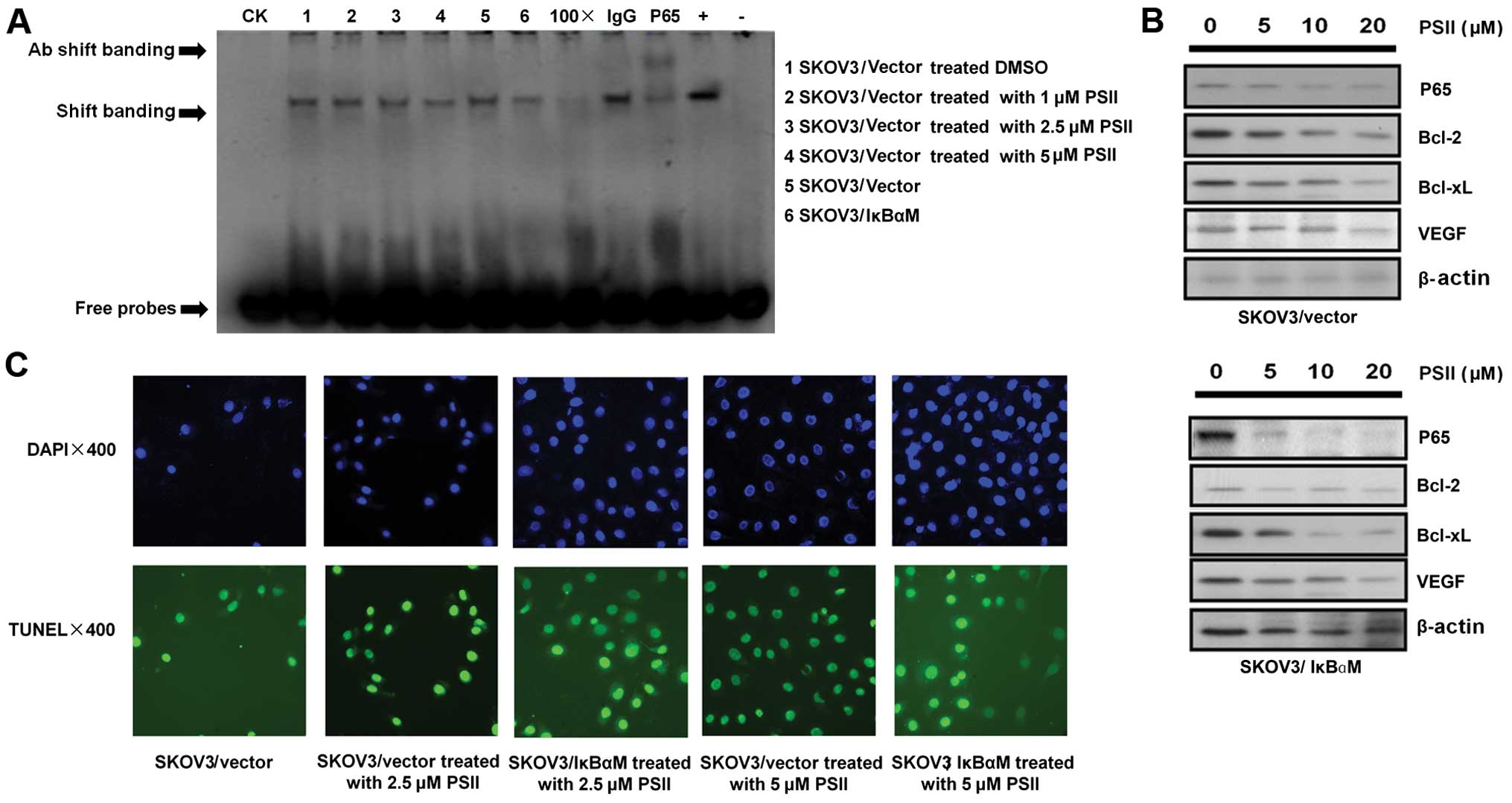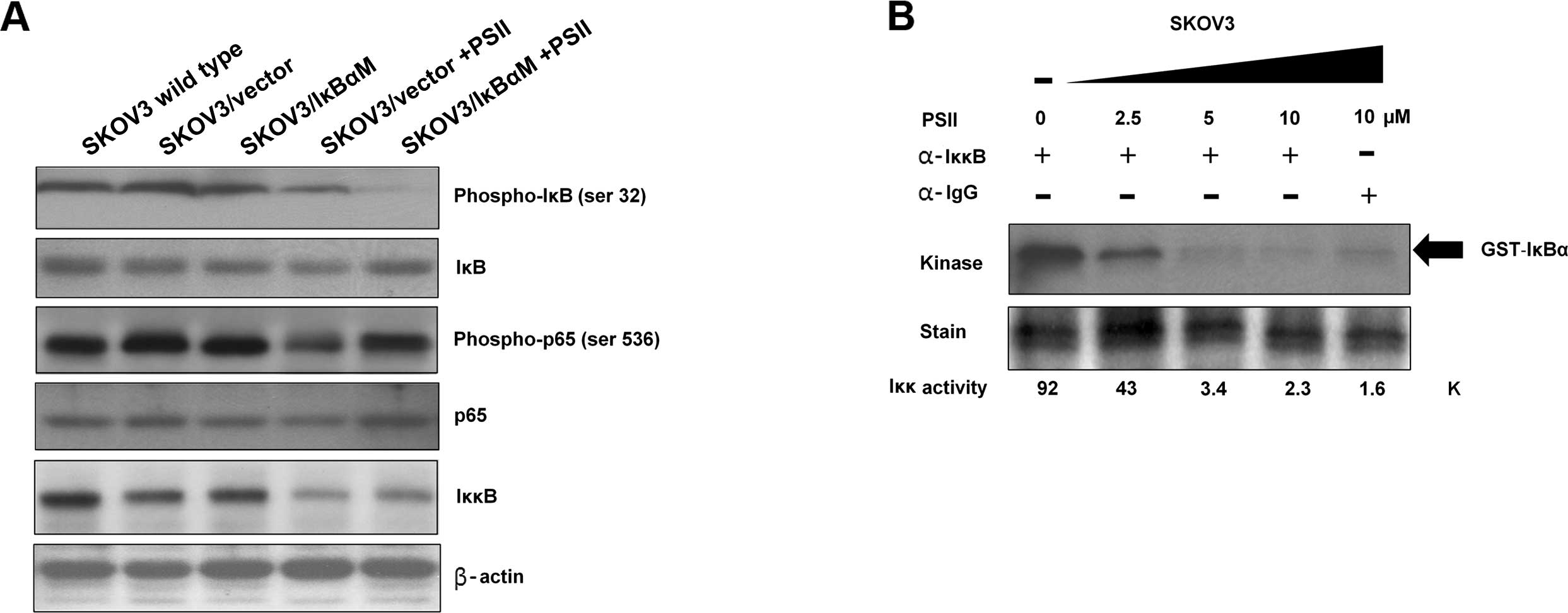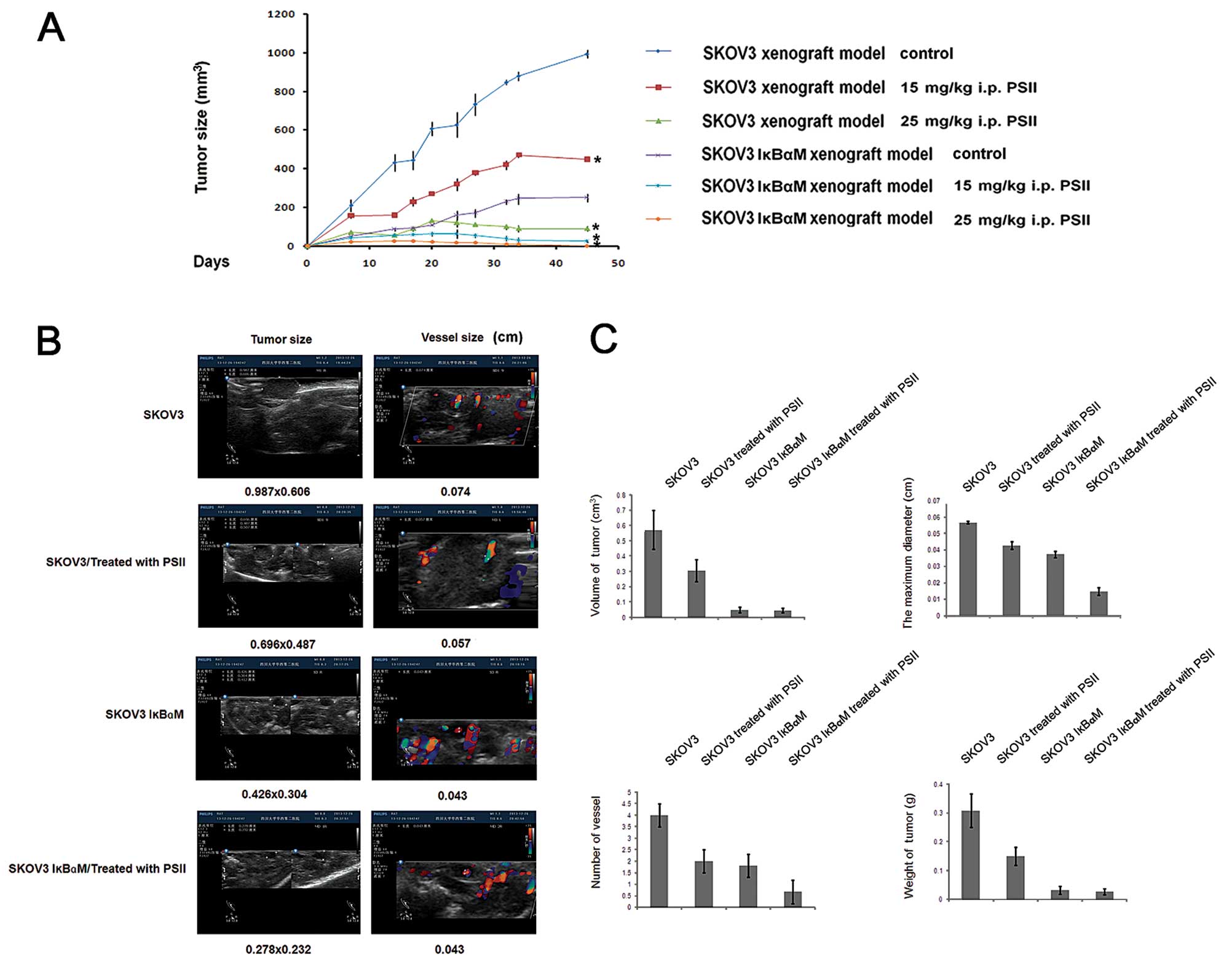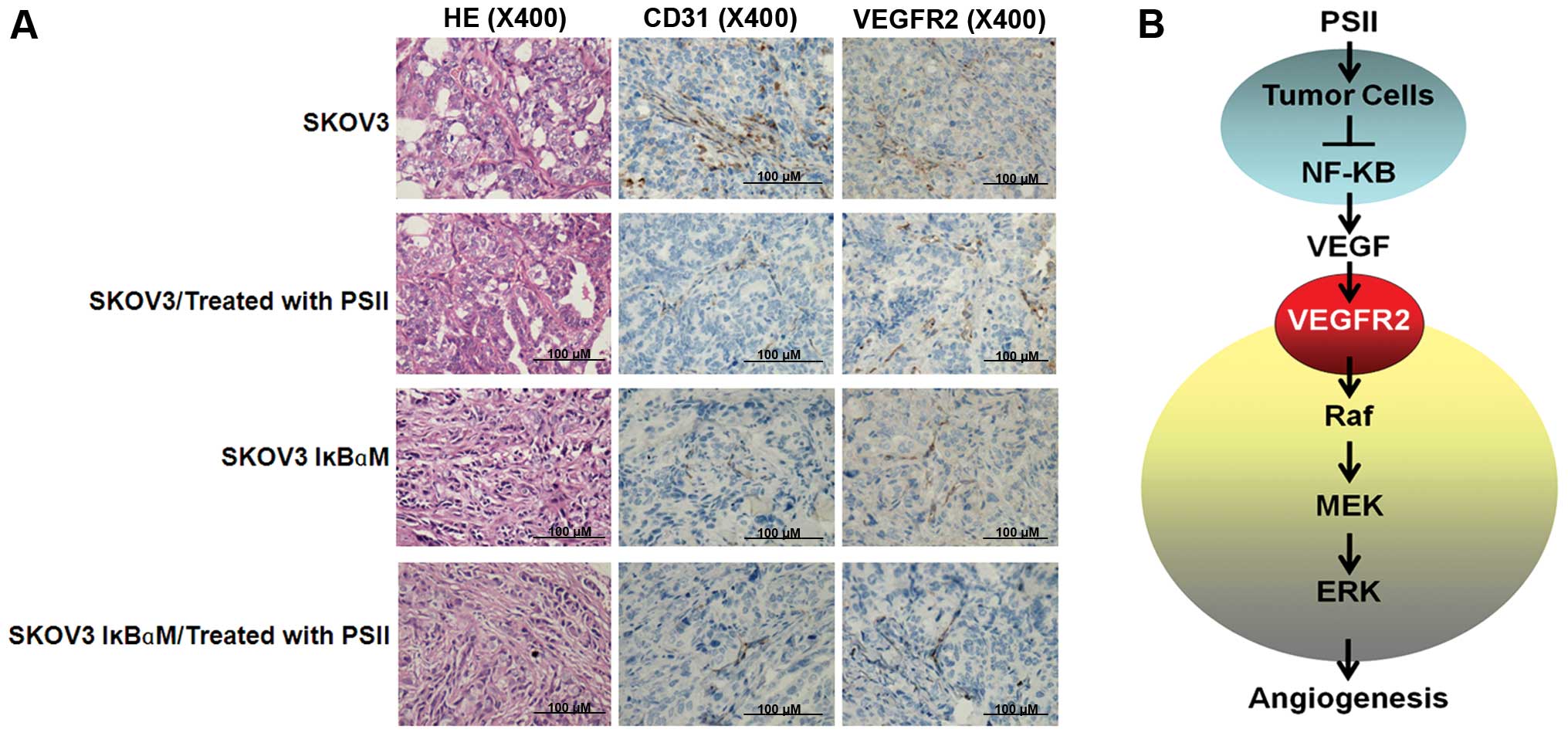|
1
|
Siegel R, Naishadham D and Jemal A: Cancer
statistics, 2013. CA Cancer J Clin. 63:11–30. 2013. View Article : Google Scholar : PubMed/NCBI
|
|
2
|
McGuire WP, Hoskins WJ, Brady MF, et al:
Cyclophosphamide and cisplatin compared with paclitaxel and
cisplatin in patients with stage III and stage IV ovarian cancer. N
Engl J Med. 334:1–6. 1996. View Article : Google Scholar : PubMed/NCBI
|
|
3
|
Eckstein N: Platinum resistance in breast
and ovarian cancer cell lines. J Exp Clin Cancer Res. 30:912011.
View Article : Google Scholar : PubMed/NCBI
|
|
4
|
Carmeliet P: Angiogenesis in life, disease
and medicine. Nature. 438:932–936. 2005. View Article : Google Scholar : PubMed/NCBI
|
|
5
|
Kerbel RS: Tumor angiogenesis. N Engl J
Med. 358:2039–2049. 2008. View Article : Google Scholar : PubMed/NCBI
|
|
6
|
Xu W, Liu LZ, Loizidou M, Ahmed M and
Charles IG: The role of nitric oxide in cancer. Cell Res.
12:311–320. 2002. View Article : Google Scholar
|
|
7
|
Ferrara N and Kerbel RS: Angiogenesis as a
therapeutic target. Nature. 438:967–974. 2005. View Article : Google Scholar : PubMed/NCBI
|
|
8
|
Huang S, Robinson JB, Deguzman A, Bucana
CD and Fidler IJ: Blockade of nuclear factor-κB signaling inhibits
angiogenesis and tumorigenicity of human ovarian cancer cells by
suppressing expression of vascular endothelial growth factor and
interleukin 8. Cancer Res. 60:5334–5339. 2000.PubMed/NCBI
|
|
9
|
Aggarwal BB: Nuclear factor-kappaB: the
enemy within. Cancer Cell. 6:203–208. 2004. View Article : Google Scholar : PubMed/NCBI
|
|
10
|
Yu HG, Yu LL, Yang Y, et al: Increased
expression of RelA/nuclear factor-κB protein correlates with
colorectal tumorigenesis. Oncology. 65:37–45. 2003. View Article : Google Scholar
|
|
11
|
Biswas DK, Shi Q, Baily S, et al: nf-κb
activation in human breast cancer specimens and its role in cell
proliferation and apoptosis. Proc Natl Acad Sci USA.
101:10137–10142. 2004. View Article : Google Scholar
|
|
12
|
Gilmore TD, Koedood M, Piffat KA and White
DW: Rel/NF-kappaB/IkappaB proteins and cancer. Oncogene.
13:1367–1378. 1996.PubMed/NCBI
|
|
13
|
Yang G, Xiao X, Rosen DG, et al: The
biphasic role of nf-κb in progression and chemoresistance of
ovarian cancer. Clin Cancer Res. 17:2181–2194. 2011. View Article : Google Scholar : PubMed/NCBI
|
|
14
|
Scherer DC, Brockman JA, Chen Z, Maniatis
T and Ballard DW: Signal-induced degradation of IκBα requires
site-specific ubiquitination. Proc Natl Acad Sci USA.
92:11259–11263. 1995. View Article : Google Scholar
|
|
15
|
Brown K, Gerstberger S, Carlson L,
Franzoso G and Siebenlist U: Control of I kappa B-alpha proteolysis
by site-specific, signal-induced phosphorylation. Science.
267:1485–1488. 1995. View Article : Google Scholar : PubMed/NCBI
|
|
16
|
Brockman JA, Scherer DC, McKinsey TA, et
al: Coupling of a signal response domain in iκbα to multiple
pathways for nf-κb activation. Mol Cell Biol. 15:2809–2818.
1995.PubMed/NCBI
|
|
17
|
Huang S, Pettaway CAUH, Bucana CD and
Fidler IJ: Blockade of nf-κb activity in human prostate cancer
cells is associated with suppression of angiogenesis, invasion, and
metastasis. Oncogene. 20:4188–4197. 2001. View Article : Google Scholar : PubMed/NCBI
|
|
18
|
Fujioka S, Sclabas GM, Schmidt C, et al:
Function of nuclear factor κb in pancreatic cancer metastasis. Clin
Cancer Res. 9:346–354. 2003.PubMed/NCBI
|
|
19
|
Ho JW, Leung YK and Chan CP: Herbal
medicine in the treatment of cancer. Curr Med Chem Anticancer
Agents. 2:209–214. 2002. View Article : Google Scholar
|
|
20
|
Man S, Gao W, Zhang Y, et al: Antitumor
and antimetastatic activities of Rhizoma Paridis saponins.
Steroids. 74:1051–1056. 2009. View Article : Google Scholar : PubMed/NCBI
|
|
21
|
Cosgrove D: Angiogenesis imaging -
ultrasound. Br J Radiol. 76(Spec No 1): S43–S49. 2003. View Article : Google Scholar
|
|
22
|
Howard-Claudio C: MRI methods for the
detection of angiogenesis. Supplement to Appl Radiol. 34:2005.
|
|
23
|
Man S, Gao W, Zhang Y, et al:
Characterization of steroidal saponins in saponin extract from
Paris polyphylla by liquid chromatography tandem multi-stage mass
spectrometry. Anal Bioanal Chem. 395:495–505. 2009. View Article : Google Scholar : PubMed/NCBI
|
|
24
|
Xiao X, Bai P, Bui Nguyen TM, et al: The
antitumoral effect of Paris Saponin I associated with the induction
of apoptosis through the mitochondrial pathway. Mol Cancer Ther.
8:1179–1188. 2009. View Article : Google Scholar : PubMed/NCBI
|
|
25
|
Xiao X, Zou J, Bui-Nguyen TM, et al: Paris
saponin II of Rhizoma Paridis - a novel inducer of apoptosis in
human ovarian cancer cells. Biosci Trends. 6:201–211. 2012.
View Article : Google Scholar : PubMed/NCBI
|
|
26
|
Schmitt J and Matei D: Targeting
angiogenesis in ovarian cancer. Cancer Treat Rev. 38:272–283. 2012.
View Article : Google Scholar
|
|
27
|
Nicosia RF and Ottinetti A: Growth of
microvessels in serum-free matrix culture of rat aorta. A
quantitative assay of angiogenesis in vitro. Lab Invest.
63:115–122. 1990.PubMed/NCBI
|
|
28
|
Xiao X, Yang M, Xiao J, et al: Paris
Saponin II suppresses the growth of human ovarian cancer xenografts
via modulating VEGF-mediated angiogenesis and tumor cell migration.
Cancer Chemother Pharmacol. 73:807–818. 2014. View Article : Google Scholar : PubMed/NCBI
|
|
29
|
Agbottah E, Yeh WI, Berro R, et al: Two
specific drugs, BMS-345541 and purvalanol A induce apoptosis of
HTLV-1 infected cells through inhibition of the NF-kappaB and cell
cycle pathways. AIDS Res Ther. 5:122008. View Article : Google Scholar : PubMed/NCBI
|
|
30
|
Patan S: Vasculogenesis and angiogenesis.
Cancer Treat Res. 117:3–32. 2004. View Article : Google Scholar : PubMed/NCBI
|
|
31
|
Fujioka S, Sclabas GM, Schmidt C, et al:
Inhibition of constitutive nf-κb activity by iκbα M suppresses
tumorigenesis. Oncogene. 22:1365–1370. 2003. View Article : Google Scholar : PubMed/NCBI
|
|
32
|
Wen F, Yin H, Chen C, et al: Chemical
characteristics of saponins from Paris fargesii var. brevipetala
and cytotoxic activity of its main ingredient, paris saponin H.
Fitoterapia. 83:627–635. 2012. View Article : Google Scholar : PubMed/NCBI
|
|
33
|
Nor JE, Christensen J, Mooney DJ and
Polverini PJ: Vascular endothelial growth factor (VEGF)-mediated
angiogenesis is associated with enhanced endothelial cell survival
and induction of Bcl-2 expression. Am J Pathol. 154:375–384. 1999.
View Article : Google Scholar : PubMed/NCBI
|
|
34
|
Nör JE, Christensen J, Liu J, et al:
Up-Regulation of Bcl-2 in microvascular endothelial cells enhances
intratumoral angiogenesis and accelerates tumor growth. Cancer Res.
61:2183–2188. 2001.PubMed/NCBI
|
|
35
|
Karl E, Warner K, Zeitlin B, et al: Bcl-2
acts in a proangiogenic signaling pathway through nuclear factor-κB
and CXC chemokines. Cancer Res. 65:5063–5069. 2005. View Article : Google Scholar : PubMed/NCBI
|
|
36
|
Lacouture ME, Lenihan DJ and Quaggin SE:
Antiangiogenic Therapy: Tolerability and Management of Side
Effects. 2009, http://www.angioorg/pdf/Angio_Poster_Final_6-30.pdfurisimplewww.angioorg/pdf/Angio_Poster_Final_6-30.pdf.
|















